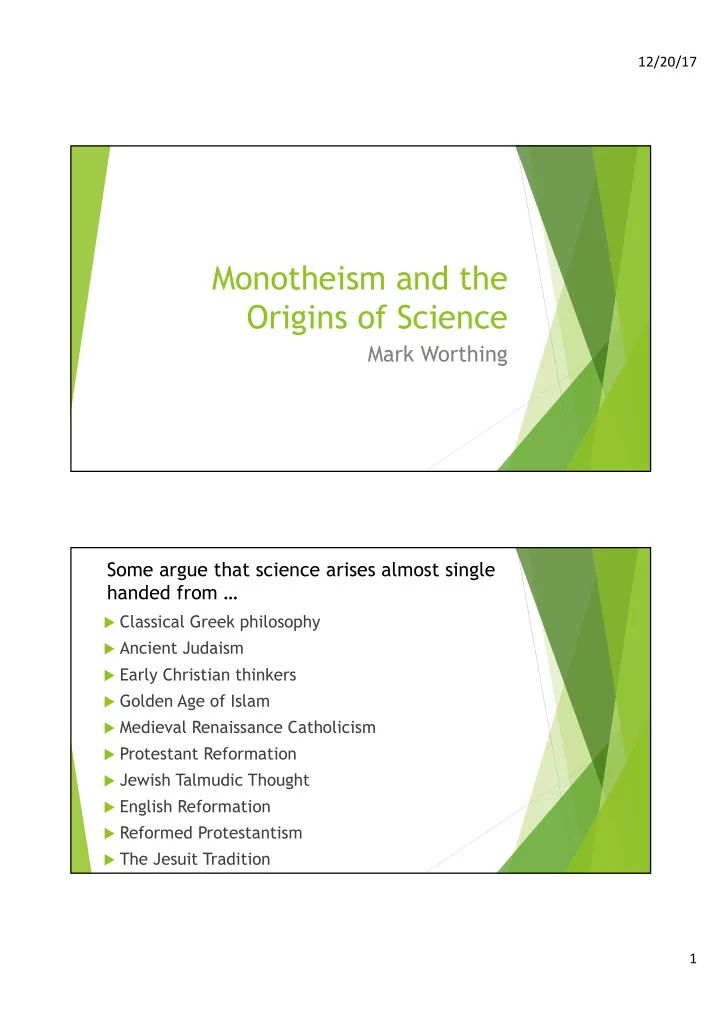

12/20/17 Monotheism and the Origins of Science Mark Worthing Some argue that science arises almost single handed from … u Classical Greek philosophy u Ancient Judaism u Early Christian thinkers u Golden Age of Islam u Medieval Renaissance Catholicism u Protestant Reformation u Jewish Talmudic Thought u English Reformation u Reformed Protestantism u The Jesuit Tradition 1
12/20/17 But if Monotheism played such a big role, what about …. u Origin of science theories cancel each other out u Significant strides were made in non- monotheistic cultures u There is no united form of monotheism u Some monotheistic cultures showed no interest in science So, what did Monotheism actually contribute? u If monotheism in any or all of its forms played a foundational role in the rise of modern science and modern research culture, then there must be factors unique to monotheism which are able to fulfil an explanatory function in any thesis that attributes such a role to monotheism. 2
12/20/17 Monotheism created a context in which questions could be asked of the natural world u Monotheism desacralised the world (Max Weber). With no local deities of rock, field, stream and trees explaining famine, flood and other natural occurrences, people were left to ask questions of why things happened. Not only did the local deities no longer provide explanations, but the desacralisation of the world meant is was now ‘safe’ to ask these questions and even conduct experiments, without offending the sacred. Modern Western persons often fail to appreciate the significance of this change. Belief in a divine Intelligence led to a search for intelligibility u If God who created the world is rational (intelligent), then there should be an inherent and discoverable rationality (intelligibility) in the universe. A logical mind will produce a logical world. 3
12/20/17 Immanuel Lutheran Church – Sir Eric von Schramek Monotheism and the unity of knowledge u If a single divine being is responsible for the whole of the created, natural order, then all knowledge about the natural world must be fundamentally interconnected. u The Muslim doctrine of Tawhid is well- known. The unity of God and the unity of all knowledge was a strong central theme in early Islamic philosophers. 4
12/20/17 Monotheism and intellectual freedom u A God whose existence and power does not depend upon our devotion and who does not require our defense, is a God who can be questioned (Job) and wo can respond to doubt with evidence (Thomas) rather than threat. Healthy monotheistic traditions produce sufficient confidence and security in their adherents so as to be able to live with religious and intellectual diversity. Monotheism, Peoples of the Book, and literacy u The role played by the sacred ‘books’ of Judaism, Christianity and Islam have served as a great impetus for literacy. The existence of copyists and those who learned to read for the primary purpose of accessing these books, meant that other ideas could also be recorded, exchanged, and passed down to through the generations. 5
12/20/17 What does this all mean for Christians in science and research today? u Belief in God is not something that needs to be overcome or worked around in order to produce quality research, but can and should be an impetus to such research u Religious traditions which gave rise to modern science and research should not now fear these u A vocation in science and/or research honours God and is a natural fit for any theist u Belief in a single, divine Creator provides a strong and natural motivation for interrogating the world around us with an open mind and the expectation that rational explanations exist Those with an active faith in God make good scientists and researchers because … u They reject superstition u They believe the world is intelligible u They believe all knowledge and all things are interconnected in many ways u They have been formed in an environment of a strong ‘book’ and ideas culture u They often have a strong appreciation for the tradition of asking hard questions and arguing with established ideas u They believe that knowledge and ideas matter u They have a strong ethical and moral foundation 6
Recommend
More recommend